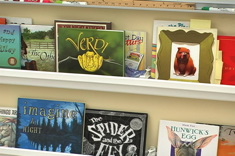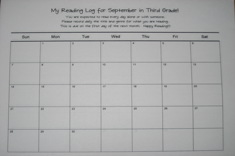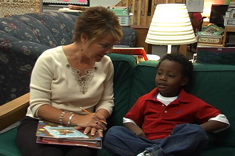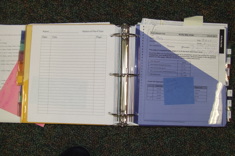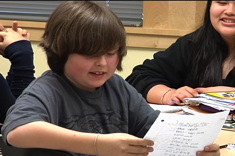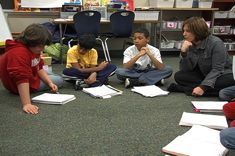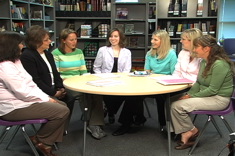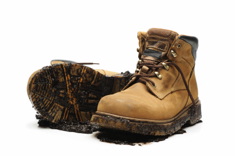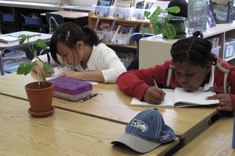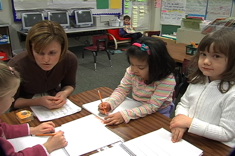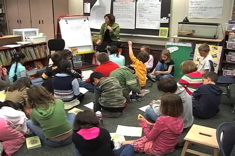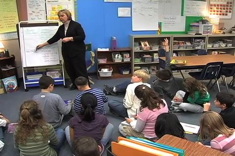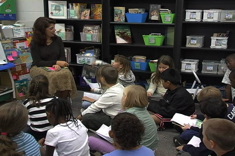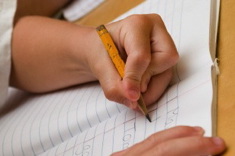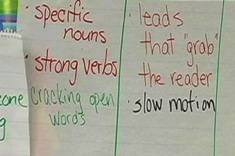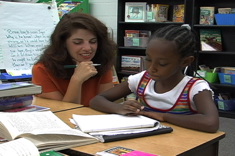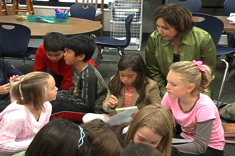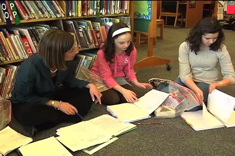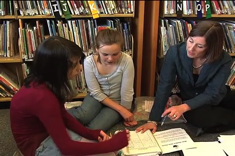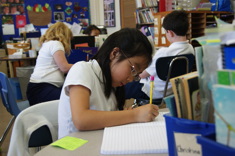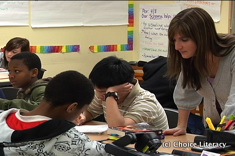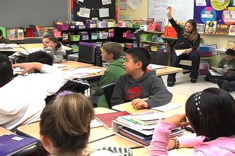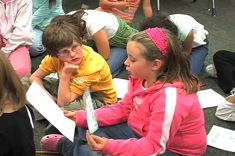Teaching Writing
Everyone who writes for Choice Literacy loves teaching writing, because we all write ourselves. We know it is "hard fun," as Donald Murray famously said—exasperating and exhilarating at the same time. The writing workshops you will read about here and see in our videos are busy, noisy, vibrant places. And most days, we wouldn't want to be anywhere else than in the midst of 'em! Here is where you'll find our latest discoveries, insights, and occasional boneheaded mistakes in teaching writing.
Latest Content
Inspiration from Author Visits: Tips and Web Resources
Jennifer Jones reflects on the power of a local author visit in her school, and also provides some quick tips and weblinks for planning a visit.
Rethinking Reading at Home
What’s the value of reading at home? Mandy Robek ponders the home/school connection. Download a copy of a rubric to assess the home reading log.
Easing into Assessments During the First Six Weeks of School
Franki Sibberson and Karen Szymusiak have suggestions for integrating observations and assessments of students naturally into reader's workshops during the first six weeks of school.
Conferring with Children: Principles and Procedures
“The Sisters” (Gail Boushey and Joan Moser) share their principles and procedures for conferring in the classroom.
Literacy Builds Community: The Jackdaw Project
"School is not summer camp" – this quote reminds Mandy Robek that there are many challenges to building a strong classroom community in the midst of demands for achievement and accountability early in the year. Her "literacy jackdaw" project is a terrific vehicle for classmates to learn about each other, and hone their listening, speaking, and writing skills in the process.
Animals as Ambassadors: Using Class Pets to Reach an English Language Learner
When a student is struggling, language barriers can make it even harder for teachers to connect. Andrea Smith finds webbing during conferring is an excellent strategy for assisting a young English language learner in her writer's workshop.
An Assessment Notebook That Works for Me
After lots of trial and error, Franki Sibberson finally has a format for her assessment notebook that works well.
Helping Aaron Find His Voice as a Writer…and Mine as a Teacher
Erin Ocon tries a new strategy for dealing with a resistant student in her middle school classroom.
Staying True to Our Beliefs When Working With Struggling Readers and Writers in Grades 3-6
Franki Sibberson writes about the challenges of holding true to our beliefs in working with struggling readers, and shares the questions she asks herself as a way of self-monitoring her teaching with strugglers.
Team Sharing of Writing Curriculum Innovations (TEMPLATE)
Ruth Shagoury finds some of the best learning in her study groups comes when participants share the new things they are trying in their classrooms. She develops a nifty one-page notetaking form to help everyone keep track of ideas they want to test out with students.
Fitness Boot Camp Helps Me Understand Struggling Readers
Franki Sibberson finishes 29th out of 30 participants in her fitness bootcamp mile run. In the process, she learns many lessons about herself and the needs of struggling learners in her classroom.
Rethinking Writing Centers – Winter Follow-Up
Shari Frost questioned the amount of writing going on in many elementary writing centers. She decided to work with a team of literacy coaches and teachers to explore ways to increase writing in classrooms – through better use of centers, or alternative programs. In this follow-up article, Shari presents two different solutions that are working well – one involves introducing writing tools in a more systematic way in centers, and the other is an implementation of a different program entirely for independent work.
Assessing Spelling in Writing Workshops Part 1: Thinking Through the Assessment
Katie DiCesare takes on the challenge of developing a one-page assessment tool to analyze the spelling needs and abilities of each of her 1st graders. This is the first in a series, as Katie takes us through the use of the tool in her workshop.
Literary Nonfiction: Models for Writing
Literary nonfiction is emerging as a popular genre. In this booklist, Franki Sibberson shares mentor texts for writing literary nonfiction.
Reflecting on the First Six Weeks of Word Study
Franki Sibberson explains how she rethought word study during the first six weeks of school, giving manypractical examples of activities and routines with her intermediate students.
To Fart or Not to Fart? Reflections on Boy Writers
"To Fart or Not to Fart?" was the question at the first meeting of Jennifer Allen's boys' literacy study group for teachers, and what followed was a rollicking discussion of writing, taste, and books that hook boys.
Fifth-Grade Word Study Homework
Karen Terlecky’s fifth-grade students share what they learned from their word study homework.
Old Elm Speaks Conclusion: Connecting Poetry, Observation, and Reading
In this second installment of a three-part video series, Aimee Buckner shows how observation skills, poetry, and reading instruction come together with the mentor text Old Elm Speaks by Kristin O'Connell George. In this final excerpt, students share what they wrote after browsing the book and completing some observations.
Helping Struggling Writers
How can we help students who are stuck when it comes time to write? Franki Sibberson shares a couple new strategies, including a book basket of texts selected by students themselves as useful for sparking writing topics in this photo essay.
Writing Strengths Anchor Chart
Suzy Kaback's anchor chart activity builds a sense of community and peer editing connections in her middle school classroom.
Learning Curves and Dips: Planning and Goal-Setting for Writing Workshop
Aimee Buckner describes a simple summer planning and goal-setting process she uses to get ready for launching writer's workshop in the fall.
Helping Students Find Their Own Mentor Texts
Franki Sibberson helps her students learn how to evaluation and discover their own mentor texts in her grades 3 and 4 literacy workshops.
Running and Reading Logs
In this first video in a two-part series, Clare Landrigan meets with a group of fourth graders to talk about reading logs and goals. In this excerpt, Clare uses the analogy of how runners use logs to chart progress and set goals.
Running and Reading Logs Part II
In this second video in a two-part series, Clare Landrigan meets with a group of 4th graders to talk about reading logs and goals. In this excerpt, Clare confers with students over their logs and debriefs with their teacher.
Rethinking Writing Centers
Shari Frost finds writing centers are beloved by many teachers and students. There’s only one problem – very little writing appears to be going on in the centers.
Weekend Headlines: Introduction
In this first of a three-part video series, Katie Doherty and her sixth grade students begin the Weekend Headlines activity. Each Monday, students listen to Katie share some of the headlines from the local newspaper and then share their "headlines" from the weekend.
Becoming More Purposeful with Writing Share
In this whole-class writing-share session from Katie DiCesare’s first-grade classroom, Katie talks about how she has become more purposeful in connecting student drafts with the minilesson from the start of the writing workshop.
Weekend Headlines: Peer Response
In this second part of a three-part video series, Katie Doherty and her sixth grade students continue the Weekend Headlines activity. In this installment, Katie sets up a peer response procedure.
Linking Math and Writing Through Word Problems
In this six-minute video, Franki Sibberson demonstrates how she helps her 3rd and 4th grade students make connections between writing workshop and math problem solving.
Staying Focused in Literacy Workshops
Clare Landrigan meets with a group of fifth graders to talk about what’s going well in literacy workshops, and to set individual goals.
Browse Content By
Type
Category
- Assessment Tools
- Big Fresh Archives
- Booklists
- Choice Numeracy
- Classroom Design
- Common Core
- Community Building
- Conferring
- Content Literacy
- Digital Literacy
- English Language Learners
- Equity
- Family Relations
- Free Samples
- Guiding Groups
- Leadership
- Literacy Coaches
- Mentor Texts
- Minilessons
- New Teacher Mentors
- Podcasts
- Poetry
- Quote Collections
- Reading Strategies
- Self Care
- Struggling and Striving Learners
- Talking and Listening
- Teacher Study Groups
- Teaching Reading
- Teaching Writing
- Word Study and Vocabulary
Author
- Melissa Quimby
- Nawal Qarooni
- Gwen Blumberg
- Julie Cox
- The Lead Learners
- Hannah Tills
- Josie Stewart
- Ruth Metcalfe
- Mallory Messenger
- Becca Burk
- Jodie Bailey
- Vivian Chen
- Mary Brower
- Tiffany Abbott Fuller
- Stephanie Affinito
- Ruth Ayres
- Leigh Anne Eck
- Heather Fisher
- Shari Frost
- Julie Johnson
- Suzy Kaback
- Gigi McAllister
- Shirl McPhillips
- Melanie Meehan
- Cathy Mere
- Debbie Miller
- Tara Barnett and Kate Mills
- Tammy Mulligan
- Dana Murphy
- Bitsy Parks
- David Pittman
- Brenda Power
- Heather Rader
- Matt Renwick
- Mandy Robek
- Christy Rush-Levine
- Gretchen Schroeder
- Jen Schwanke
- Brian Sepe
- Katherine Sokolowski
- Stella Villalba
- Jennifer Vincent
Grade Level
Choice Literacy Membership
Articles
Get full access to all Choice Literacy article content
Videos
Get full access to all Choice Literacy video content
Courses
Access Choice Literacy course curriculum and training

